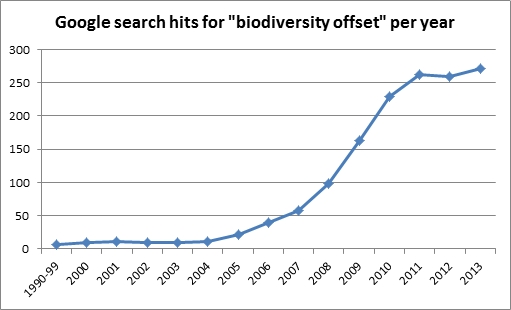“Biodiversity” is a buzzword (and “Biodiversity Offset” is becoming one)
One reason for the popularity of biodiversity offsets is inherent to the term itself: “biodiversity” is probably one of the most prominent buzzwords of the 21st century (after “sustainability” at the end of the 20th century).
Simply typing “biodiversity” into the Google search engine delivers more than forty million results, and every day several hundreds or thousands of new information sources are being produced and added (as of August 2014).
While the Google search hits for “Biodiversity Offset” (including both “Biodiversity Offsets” and “Biodiversity Offsetting”) can in no way be compared to the ones for “Biodiversity”, they still deliver a remarkable number — seen that it is a very specific and complex concept.
Biodiversity Offsets are a response to the ongoing biodiversity loss
So, the simple answer to the question would be that, similar to the biodiversity “hype”, the interest in biodiversity offsets is a result of a growing awareness and the insight that biodiversity is being lost at unprecedented rate. The International Year of Biodiversity 2010 and the following United Nations Decade of Biodiversity (2011–2020) brought this fact to the broad public debate.
While it may be true that this did in fact influence the promotion of biodiversity offsets worldwide, the (abstract) awareness of ongoing biodiversity loss falls short of providing an incentive for concrete action.
Biodiversity Offsets provide a common framework for a multitude of compensation approaches
Instead, the success (in terms of growing interest, not necessarily in terms of environmental quality) of biodiversity offsets is mainly a systemic one. The term “biodiversity offsets” provides a common framework. Under this topic a multitude of compensation approaches is grouped together (compensation, restoration, remediation, environmental offsets, habitat banks, eco-accounts, biodiversity banking, impact mitigation, wetland mitigation etc.). In the past these were mostly isolated and an exchange was also hindered through the high level of complexity and context dependence (the Brazilian Amazon can’t be compared to a wetland in the US or the African Savannah).
Now, Bush Broker in Australia, compensation agencies in Germany and Wetland Mitigation Banks in the US (to name only some of the most common) can all refer to one common point of reference: the concept of biodiversity offsets.
Environmental management has become an indispensable task – not only for “global players”
This has been particularly promoted by the Business and Biodiversity Offset Program. The BBOP platform is in place since 2004. It has engaged business, NGOs, administration and academia in developing quality standards and an implementation toolkit for biodiversity offsets (source: BBOP).
Together with some of their business partners (e.g. Rio Tinto, Anglo American and Newmont) BBOP has also trialed a small number of pilot projects (source: BBOP).
A reason for businesses and governments to get involved in this process was the growing public pressure to manage the environmental impact of their activities.
Howard (2007) stresses that environmental management has become an indispensable task – not only for “global players”.


